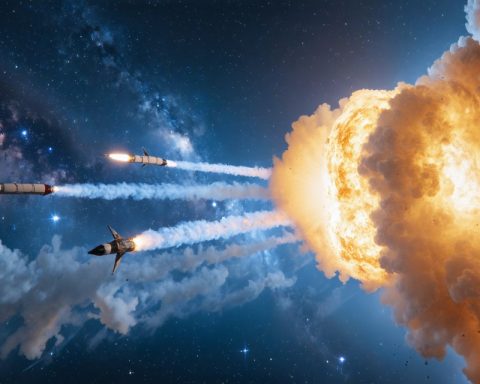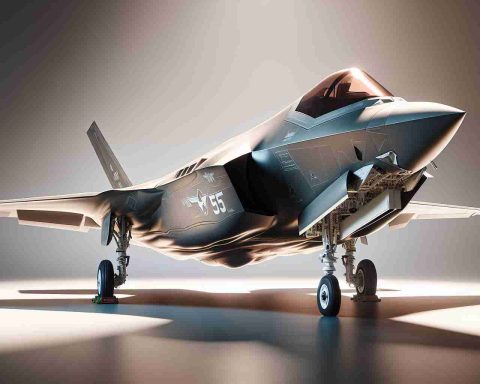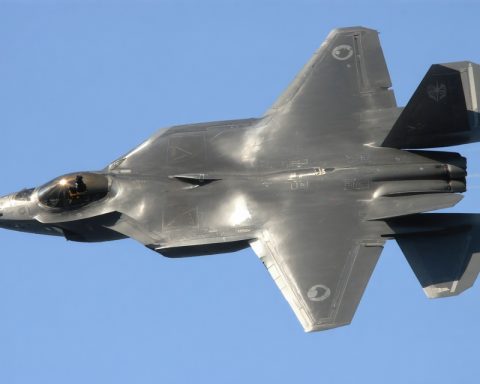In a harrowing escalation of conflict, a missile attack in central Kyiv resulted in the tragic deaths of four individuals and left three others injured early Saturday morning. This assault, according to Russia’s defense ministry, was retaliation for a recent Ukrainian strike that reportedly utilized American-made ATACMS tactical missiles against targets in the Belgorod region.
Ukrainian President Volodymyr Zelensky condemned the strike, emphasizing the human cost of this ongoing turmoil. The missile hit critical locations, including the entrance to a major subway station and a vital water supply pipeline, alongside damages to a nearby McDonald’s restaurant. Remarkably, the assault occurred just a few kilometers from the presidential palace, intensifying fears for civilian safety.
The Russian defense officials claimed their missile strike had specifically targeted a rocket manufacturing facility, asserting that they had met all their operational goals. This assault came in the wake of other violent incidents earlier in the week, especially in Kryvyi Rih, Zelensky’s hometown, and affected western regions of Ukraine. These earlier attacks resulted in nationwide emergency power outages and prompted Poland to heighten its military readiness by deploying jets to the border.
As the repercussions of the attacks unfold, the specter of uncertainty and fear looms heavily over the region, leaving many to question when this cycle of retaliation will cease.
Wider Impacts of the Ukraine Conflict: A Global Perspective
The recent missile strikes in Kyiv are emblematic of a deeper, ongoing crisis that resonates far beyond the borders of Ukraine. As the conflict escalates, its implications ripple through society, culture, and the global economy. The tragic loss of life in Kyiv reflects not only a humanitarian disaster but a stark reminder of the vulnerabilities of modern urban environments during warfare. Urban centers are increasingly becoming battlegrounds, where civilians are caught in the crossfire, leading to a culture of fear and instability.
In terms of economic consequences, the conflict is disrupting markets, particularly in Europe. Energy prices are soaring as countries grapple with the unpredictability of Russian supply and the need for alternative sources. A heightened military readiness in Poland, as a response to escalating threats, highlights the growing military expenditure across Europe, which could reshape financial priorities and impact economic recovery post-pandemic.
The environmental ramifications are equally concerning. Ongoing conflict often leads to significant ecological damage—deteriorating water supplies, contaminated land, and wildlife displacement. The destruction of critical infrastructure not only affects immediate human health but can leave long-lasting scars on the ecosystem.
As the world watches, the future trends of geopolitical alignments are also shifting. Countries previously neutral may pivot towards alliances, reshaping international relations and potentially setting the stage for new conflicts. The long-term significance of this cycle of violence raises critical questions about the effectiveness of diplomacy and humanitarian aid in conflict resolution.
In conclusion, the broader implications of the situation extend far beyond immediate military objectives, underscoring the need for a comprehensive approach that addresses both the humanitarian and geopolitical crises in the region.
As Tensions Escalate in Kyiv: Understanding the Human and Strategic Costs of Missile Attacks
The Current Situation in Kyiv
A recent missile attack in central Kyiv has resulted in a tragic loss of life, with four individuals killed and three others injured. This incident marks a significant escalation in the ongoing conflict between Ukraine and Russia, characterized by retaliatory strikes that are harming civilian infrastructure and causing widespread fear.
Background of the Conflict
This particular missile strike has been framed by Russia’s defense ministry as a response to Ukraine’s use of American-made ATACMS tactical missiles targeting the Belgorod region. Such developments indicate how international military support is influencing the dynamics of the conflict. The violence, which also included earlier attacks in places like Kryvyi Rih, highlights a grim pattern of escalating military exchanges that continue to affect civilian populations.
Impacts on Civilian Life
The missile struck critical areas of Kyiv, hitting a subway station entrance, a water supply pipeline, and a fast-food restaurant. These attacks raise significant concerns about civilian safety in urban areas, especially since the incident occurred near key governmental and residential landmarks. In light of this, Ukrainians are grappling with the psychological toll of living under the constant threat of missile strikes, exacerbating the humanitarian crisis.
Ukrainian Government Response
Ukrainian President Volodymyr Zelensky condemned the Russian missile strike, emphasizing the tragic consequences for civilians. His administration is under pressure to bolster defenses and provide adequate support to victims and their families. This response could also lead to increased calls for further military assistance from Western allies to ensure the protection of Ukrainian territories and populations.
International Military Readiness
In a related move, Poland has increased its military readiness in response to the heightened tensions along its border with Ukraine. The deployment of jets underscores the broader regional anxiety and attempts by neighboring countries to prepare for any spillover effects of the conflict.
The Broader Implications
The cycle of retaliation between Ukraine and Russia raises intricate questions about the future of the region. The ongoing violence undermines peace efforts and places immense strain on both countries’ resources, emergency services, and non-profit organizations dedicated to humanitarian aid.
Trends and Predictions
As international dynamics evolve, future engagements could see a combination of military escalations and diplomatic attempts for de-escalation. Analysts are closely watching for changes in Western military support, as these decisions could heavily influence Ukraine’s defensive capabilities and Russia’s operational strategies.
Conclusion
The recent missile strikes in Kyiv highlight the tragic impact of the ongoing conflict between Ukraine and Russia, emphasizing the urgent need for humanitarian considerations and international diplomatic efforts. As situation develops, the world remains alert to the potential for further escalation and the profound consequences it holds for civilians in the region.
For further information about military developments and the implications on global politics, visit Reuters.












